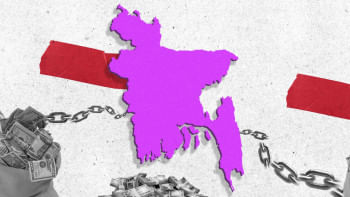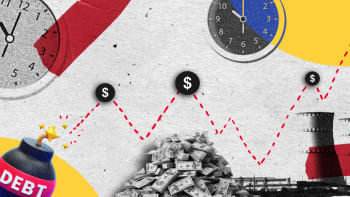We must be cautious about foreign debts

It is concerning that Bangladesh's interest payments on external borrowing are projected to increase by 65 percent within three years. This is due to rising global interest rates and an expanded foreign loan portfolio. It goes without saying that the rise in foreign debt costs will put further pressure on our dwindling foreign currency reserves. As such, it is crucial for the government to carefully analyse our debt situation before taking on any future foreign loans.
According to a finance ministry report, Bangladesh's debt interest payments alone will rise to $2.21 billion by 2027 with the taka losing 35 percent of its value against the dollar over the last two years. The principal amount is also estimated to rise by 28 percent to $3.17 billion in fiscal 2026-27, compared to the current fiscal year. Foreign loan repayments—including interest and principal amount—are projected to reach $3.82 billion in the current fiscal year. By 2027, the amount owed is expected to rise to $5.38 billion. And the proportion of external interest payments in the budget is also expected to rise from 0.9 percent in FY22 to 2.6 percent in FY27.
Two major factors are also contributing to the increase in interest payments for foreign loans. The first is that the reference rates—an interest rate benchmark used to set other interest rates—in advanced countries are expected to stay high, and the second is that Bangladesh's graduation from the category of LDCs will gradually narrow the window for getting concessional loans from external sources. The latter is something we have known for a while; therefore, the government should be in the process of preparing plans to be able to manoeuvre without hiccups in light of that fact—and if it hasn't started already, it should definitely do so now.
As the finance ministry report itself has admitted, managing these debt service obligations is essential for ensuring financial stability and preventing liquidity crisis. Since Bangladesh is not out of its forex crisis yet, this becomes even more important. Hence, not only should the government be judicious when it comes to taking loans, it should also be prudent in its use of foreign funds. Which means the government has to do a better job of choosing projects that are of high social and economic importance, and must refrain from taking on unnecessary projects that will put further strain on our external debt situation, without giving any major benefits in return.


 For all latest news, follow The Daily Star's Google News channel.
For all latest news, follow The Daily Star's Google News channel. 










Comments